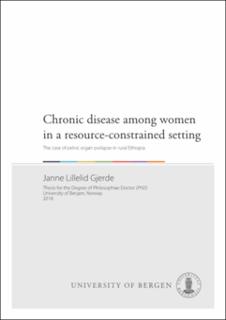| dc.contributor.author | Gjerde, Janne Lillelid | en_US |
| dc.date.accessioned | 2018-10-19T08:21:23Z | |
| dc.date.available | 2018-10-19T08:21:23Z | |
| dc.date.issued | 2018-10-08 | |
| dc.identifier.isbn | 978-82-308-3659-0 | en_US |
| dc.identifier.uri | https://hdl.handle.net/1956/18651 | |
| dc.description.abstract | Background: Pregnancy and childbirth are major risk factors for pelvic floor disorders worldwide. Many of the affected women live in resource-constrained settings with high fertility rates, early-age deliveries and limited access to obstetric care. For women with advanced stages of symptomatic pelvic organ prolapse living in impoverished contexts, the lack of knowledge of and access to surgical treatment may severely affect practical, social and emotional aspects of their lives and may lead to many years of suffering. Objectives: This study aims to enhance the understanding of how women with pelvic organ prolapse in rural parts of the Amhara region in Ethiopia experience living with the condition, their search for improvement of the condition, the recovery and the reintegration into their communities after having been provided with (free) surgical treatment. Methods: The study has an explorative qualitative design. The data material was collected through fieldwork at hospital and community levels in the Amhara region of Northern Ethiopia in 2015 and 2016. The fieldwork implied participant observation, in-depth interviews and focus group discussions. The main informants included a total of 32 women with pelvic organ prolapse ranging from 24 to70 years with various lengths of suffering and stages of the condition. A total of 18 additional informants took part in the study; health care providers, local healers and people from the local health authorities and non-governmental organisations. Results: Paper I describes the women’s explanation of pelvic organ prolapse as caused and aggravated by physical strains on their body, such as childbirth, food scarcity or hard physical work. It describes the daily challenges that the affected women faced and their attempts to deal with these in order to manage their work, meanwhile striving to keep the condition a secret from people around them in fear of embarrassment and discrimination. Paper II illustrates through three case stories the manner in which many women living with pelvic organ prolapse struggle to find remedies and a solution for their aggravating ailment. Strongly influenced by poverty, by lack of knowledge about the condition, by their religious and spiritual beliefs and by the shame and embarrassment related to the condition; the women navigate between various available healing options, both within and beyond the public health care sector. The paper further sheds light on the implications of introducing a free treatment initiative targeting women with pelvic organ prolapse in the present study context. Paper III focuses on the recovery period and the experienced positive transformation taking place in many of the women’s lives after having received free surgical treatment. Strong mobilizations of family network facilitated work-related- and social support during the immediate post-surgery period, and for some also on a long term basis. At the time of inquiry all the informants spoke openly to others about their health condition and several actively engaged in creating awareness about the condition in their communities. Conclusions: The study highlights how symptomatic pelvic organ prolapse may, in quite severe ways, affect women’s lives in a resource-constrained setting, and how a complex web of barriers commonly prevent them from gaining knowledge about the condition and from receiving quality health care. The study moreover illustrates how, in a highly vulnerable population, the provision of free quality medical service for a highly prevalent and readily treatable maternal morbidity may dramatically alter women’s health, health-and illness-related health seeking strategies as well as degree of openness surrounding illness perceived as embarrassing and shameful. | en_US |
| dc.language.iso | eng | eng |
| dc.publisher | The University of Bergen | eng |
| dc.relation.haspart | Paper I: Gjerde, J.L., Rortveit G., Muleta M., Adefris M., Blystad A. Living with pelvic organ prolapse: voices of women from Amhara region, Ethiopia. Int Urogynecol J, 2017; 28: 361-366. The article is available at: <a href="http://hdl.handle.net/1956/15963" target="blank"> http://hdl.handle.net/1956/15963</a> | en_US |
| dc.relation.haspart | Paper II: Gjerde, J.L., Rortveit G., Adefris M., Mekonnen H., Belayneh, T., Blystad A. The lucky ones get cured: Health care seeking among women with pelvic organ prolapse in Amhara Region, Ethiopia. The article is not available in BORA. | en_US |
| dc.relation.haspart | Paper III: Gjerde, J.L., Rortveit G., Adefris M., Belayneh, T., Blystad A. Life after pelvic organ prolapse surgery: A qualitative study in Amhara region, Ethiopia. BMC Womens Health, 2018; 18: 74. The article is available at: <a href="http://hdl.handle.net/1956/18650" target="blank"> http://hdl.handle.net/1956/18650</a> | en_US |
| dc.title | Chronic disease among women in a resource-constrained setting. The case of pelvic organ prolapse in rural Ethiopia | en_US |
| dc.type | Doctoral thesis | |
| dc.rights.holder | Copyright the author. All rights reserved | |
| dc.identifier.cristin | 1615143 | |
